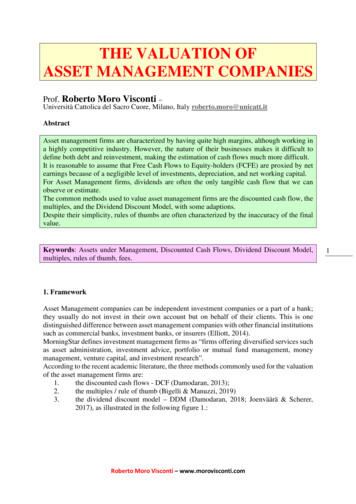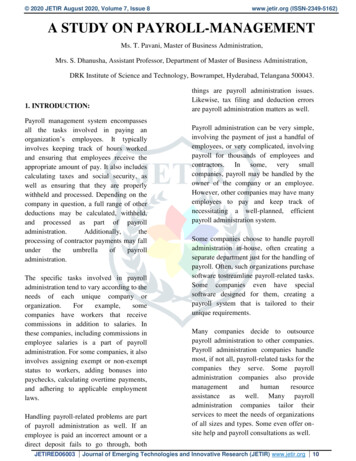
Transcription
What cancompanies doto support HIVpositive workers?Recommendationsfor Africanworkplaces1
Public Engagement Toolkit 2011 Biomedical Research and TrainingInstitute, LSE Institute of Social PsychologyWritten by Kerry Scott, Morten Skovdal,Catherine Campbell and Claudius Madanhire,Constance Nyamukapa and Simon GregsonDrawings are produced by Peter StrauliDesign: LSE Design Unit(www.lse.ac.uk/designunit)This booklet is produced with support from theLSE Higher Education Innovation Fund
CONTENTSIntroduction 2Why support HIV-positive workers? 4The cost of untreated HIV/AIDS to African workplaces 5Workplace HIV management: Healthier workers,healthier business 6How can workplaces support HIV-positiveworkers? 71: Develop and publicise a workplace HIV/AIDS policy 82: Run a workplace HIV testing and counselling programtailored for high uptake 83: Develop an HIV management strategy for employees 84: Make confidentiality a priority 95: Bring management onside 96: Help HIV-positive employees visit the clinic 107: Adjust duties for HIV-positive employeeswhen necessary 108: Help workers take their medicines 119: Provide a platform for peer educators 1110: Help keep HIV-positive workers strong throughsupporting good nutrition and addressing infections 11Conclusion 121
INTRODUCTION2
What is thepurpose of thisbooklet?The purpose of this booklet is to help workplaces supporttheir HIV-positive employees.Helping workers determine their HIV status and manage theirinfection is an important way that employers can contributeto combating the HIV/AIDS epidemic. It is an ethical dutyand also smart business. Good workplace HIV managementcan keep HIV-positive workers healthy for many years andultimately increase the company’s productivity.In section one, this booklet explains why supporting HIVpositive workers is so important for businesses. In sectiontwo, it provides concrete recommendations on how to goabout it.The recommendations presented here have come from (a)reviewing reports on what African companies are doingabout HIV and (b) interviewing Zimbabwean workers onantiretroviral treatment (ART).3
Why support HIVpositive workers?4
The cost of untreated HIV/AIDS ToAfrican workplacesHIV primarily affects adults in the prime of their lives.These are the years when people are most productive andare contributing to the workforce.There are many costs associated with HIV that workplacesmust consider.Direct costs:The overall adult HIV rate in sub-Saharan Africa is 5 percent. However, many countries and groups have higherrates. For example, 24 percent of adults in Botswana and14 percent in Zimbabwe were HIV positive in 2009 (seeChart 1).Certain workplaces, such as mining, manufacturing andtransport, are particularly affected. They will have higherpercentages of HIV-positive workers. These sectors ofteninvolve higher-risk lifestyles and long periods of time awayfrom family.Chart 1: Adult HIV rates in southern AfricaCountryAdult (15-49)HIV rate (%) Sick leave Medical care Death benefits Funeral costsIndirect costs: Lower productivity from sick workers Strain on all workers because they take on extra workthat sick colleagues cannot handle Staff demoralization Injury to employees and damage to equipment orproducts because of unfit workersAngola2.0 Loss of experienced staff and institutional memoryBotswana24.8Democratic Republic of the Congo1.2-1.5 Recruiting and training new employees to replacethose too sick to 5Mozambique11.5Namibia13.1South we14.3Sub-Saharan African average5.0Employees with untreated HIV/AIDS are unable to be asproductive as healthy workers. They also have to takemore time off.A study of tea pluckers found that those withuntreated HIV/AIDS plucked 25-30 per cent less leavesthan HIV-negative workers. They were also absent 1850 days more than their healthy colleagues over theprevious two years.Source: Rosen, S, Feeley, F, Connelly, P, and Simon, J. (2007). Theprivate sector and HIV/AIDS in Africa: taking stock of 6 years ofapplied research. AIDS, 21 (Suppl 3), S 41- S51.Source: AVERT (2009). Sub-Saharan Africa HIV & AIDS statistics. m5
Workplace HIV management:Healthier Workers, healthier businessHow employers across Africa respond to HIV in theirworkforces will have an enormous affect on millions of lives.HIV-positive workers who are able to access and adhereto antiretroviral treatment (ART) can live and work ingood health for many years. Workplaces can make thisaccess and adherence possible.Workers on ART are less likely to be absent, are moreproductive. Workplaces that help workers manage theirHIV infection can save a lot of money.Saving lives, saving costsAn electric company in Côte d’Ivoire compared theyear before ART provision to the two year period after.The company had 3,500 employees, most of whomare professional and trained for one to five years. Itsannual profits were around US 5.6 million.They found a: 94 per cent decrease in HIV-related absenteeism, 81 per cent decrease in HIV-related hospitalisations, 8 per cent decrease in new clinical cases of AIDS and 58 per cent decrease in HIV-related mortality.These changes brought about by ART resulted in savingsof over half a million dollars (USD) in the two years,including US 287 000 saved due to reduced absenteeism.Source: Eholie, S, Nolan, M, et al. (2003). Antiretroviral Treatmentcan be Cost-saving for Industry and Life-saving for Workers: aCase Study from Côte d’Ivoire’s Private Sector. Economics of AIDSand access to HIV/AIDS care in developing countries, issues andchallenges. Paris: Agence Nationale de Recherches sur le Sida.6
How canworkplacessupportHIV-positiveWORKERS?7
10 RECOMMENDATIONS ON HOWWORKPLACES CAN SUPPORT HIV WORKERSWorkplace HIV programmes require initial upfront cost. Butthey can quickly pay for themselves through the economicbenefits of keeping HIV-positive workers healthy.However, if workers do not access or stick to services, thecosts of HIV management, and the costs to business ingeneral, increase.This section provides 10 concrete recommendations onhow workplaces can support HIV-positive employees sothat they access and adhere to treatment and stay healthy.Recommendation 1:Develop and publicise a Workplace HIV/AIDS policyEmployees are often very afraid that being HIV-positivewill lead to workplace discrimination and losing their job.This fear can cause them to decide not to get tested or tohide their HIV-positive status. It is hard to support workerswho do not know if they are HIV-positive or who areafraid to use workplace programmes.The first step to reducing this fear is to develop aworkplace HIV/AIDS policy. It should include: An affirmation of the right of all employees to fairaccess to benefits, promotions, pay and continuedemployment regardless of HIV status A clear statement of zero tolerance for discrimination Directions for employees on what they can do if theyhave an HIV-related complaint The right for employees to confidentiality and nondisclosure of their statusWorkplace VCT attracts the highest number ofemployees when: It is offered on the worksite (rather than sendingemployees away somewhere) Workers are given time off to go for testing Workers receive their results at the time of testing Testing is linked to education about the supportavailable for HIV-positive people Testing is conducted by an external agency It is emphasized that management will not be able toaccess their results.Positive ways to encourage testing Offer a prize draw for all who get tested Create a friendly competition between sections bypublishing the testing levels of different sections.Recommendation 3:Develop an HIV management Strategy for employeesWorkplaces need a strategy to supply HIV managementfor employers.About 10 per cent of all HIV-positive people at any giventime will require ART. HIV-positive workers in the earlierstages of infection will likely not need ART. However, allHIV-positive people need HIV management, ie, supportand monitoring to remain healthy.HIV management includes:To ensure everyone reads it, the policy should betranslated into local languages and put up in manyeasy-to-see places around the worksite. Regular HIV stagingRecommendation 2:Run a workplace HIV testing and Counsellingprogramme tailored for high uptake Regular CD4 blood cell countsA workplace cannot support HIV-positive workers untilworkers themselves know their HIV status. Runningvoluntary testing and counselling (VCT) at workplaces islow in cost and extremely important. Nutritional and lifestyle counsellingTesting can catch HIV-infections before people startfeeling sick. The earlier HIV-positive people know theirstatus, the faster they can begin taking appropriatedrugs, accessing counselling and taking steps to avoidre-infection or infecting others.8 ART for those who need it Treatment for any subsequent infections, especiallytuberculosis and sexually transmitted infections (STIs)How can the workplace provide HIV management?Some larger employers can provide all this carethemselves, through onsite clinics. They may teamup with government or non-government healthcareproviders to bring in services and drugs.Others provide employees with private medical insurance.Others help link their workers to public services, for
example by driving employees to appointments atpublic hospitals.direct managers can make life a lot easier, and encourageadherence to treatment.The best strategy for workplaces will depend on size andlocation of company, proximity to public services andhealth insurance situation. No matter what, workplacescan always undertake onsite HIV outreach and education.Management can help in many ways, including: Setting an example by getting tested Encouraging openness about HIVRecommendation 4:Make confidentiality a priority Making it clear that they do not tolerate discriminationEveryone has the right to confidentiality, ie, to controlwho knows about their HIV-status. Adapting the workplace for HIV positive workersA main reason why people do not get tested and do notstick with HIV treatment is because they are afraid ofother people finding out that they are HIV-positive.If an employee tells his/her boss about being HIVpositive it must remain confidential. Employers mustnever disclose an employee’s HIV status unless they havepermission from the employee. Allowing workers time off for clinic visitsLower level management need support from theirsuperiors to foster a safe and supportive workplace.They need permission and encouragement toaccommodate HIV-positive workers and support theworkplace HIV policies.Practically, it can be hard to maintain confidentiality aboutHIV, especially when HIV-positive workers are encouragedto access special services.It requires creativity to find ways for workers to access theHIV services they need without everyone else finding outthey are HIV-positive.Creative ideas for confidentiality Some workplace clinics allow HIV-positive workersto collect pills anytime, rather than on ‘HIV days’ Some workplaces (such as BWM) adapted facilitieswithin the company to allow for better privacyduring discussions with health carers.Ideally, someday stigma around HIV will reduce so muchthat people will not worry about their status beingdiscovered by others. Until then, employers must becreative to maintain confidentiality at the workplace.Recommendation 5:Bring management onsideManagers play a very important role in encouraging testingand helping HIV-positive people manage their infection.Short term gain, long-term lossIf lower level managers are under intense pressure tomeet short-term deadlines they will see disruptionsrelated to HIV testing and care as a burden.If managers discourage workers from taking time off forHIV support, the workers will be less likely to get testedor to adhere to their HIV management programme. HIVcan then progress more quickly into AIDS, leading to greathuman suffering. In addition, the employee will have to stopworking completely, bringing higher costs to the company.Upper level management must encourage lower-levelsupervisors to accommodate HIV care.From the CEO to the field team leader, each has a hugeimpact on setting the tone about HIV for their staff. Forthose living on ART, understanding and support from9
‘The company should alsoencourage the seniormanagement to take up HIV testsso that everyone knows thatthey are serious about this issue.’– ML, 50, Zimbabwean forestry estate workerRecommendation 6:Help HIV-positive employees visit the clinicMost people on HIV management programmes need tovisit the clinic every month or two for check-ups and tocollect drugs.Workplaces that provide support such as transportation toclinics or on-site care can actually benefit from increasedefficiency because they reduce the time, money and energyworkers must expend on the HIV-management regime.Recommendation 7:Adjust duties for HIV-positive employeeswhen necessaryHIV-positive people generally want to continue workingas normally as possible for as long as possible. Workprovides more than a paycheque; it offers an identity, asense of purpose, and a way of maintaining a normal rolein society.A small amount of ‘reasonable accommodation’ is usuallyenough to enable workers to remain productive members ofthe workforce. This can include allowing HIV-positive workersto do alternative, lighter duties, or work shorter shifts.Reassigning HIV-positive people to special workgroupsis generally unnecessary and can be unwelcome andstigmatizing. It can also discourage other workers frombeing tested or from disclosing their status.‘Some departments are so busyand production oriented thatone cannot take a minute. If asupervisor does not understandthey would say: “you AIDS patientsyou are difficult to work with”because the worker would haveasked to be excused for some fewmoments to take the drugs.’– TE, 52, tea factory worker10
greater influence on changing attitudes and behavioursthan seeing posters or hearing outside experts.Recommendation 8:Help workers take their medicationsWorkers on antiretroviral treatment or pre-ART needworkplace support to take their medicines.It is very important that the pills are taken at exactly theright time and that they are taken without fail. These pillsmust also be eaten with some food.How to help workers take their medicine Allowing workers to take the few minutes off to havea snack and take their pills when needed Maintaining predictable hours for HIV-positive employeesMany workers time their drug regime based on their workschedule. Disrupting this schedule can throw off their HIVmanagement program. Having to stay late unexpectedlycan cause a worker to miss a dose if the pills are at home.Some industries require workers to alternate betweenday and night shifts and to work overtime when needed.Workplaces may want to consider allowing HIV-positiveworkers to remain in day shifts to reduce fatigue andmaintain consistency.Recommendation 9:Provide a platform for peer educatorsPeer education can help demystify HIV, reduce some ofthe fear about HIV, encourage testing, and help peopledevelop practical strategies to cope with HIV or avoidcontracting it.The most exciting thing about peer education with HIVpositive workers is that it breaks down fear and stigmaabout HIV.Recommendation 10:Help keep HIV-positive workers strong throughsupporting good nutrition and addressing infectionsAccess to healthy food is a central component of HIVmanagement. Good nutrition strengthens immune systemsand keeps HIV positive people healthier for longer.Research suggests that the struggle to find nutritious foodand the discomfort of taking ARVs on an empty stomachled some patients to discontinue treatment. Employers canadd nutritional supplementation to their employee wellnessprogrammes to help HIV positive workers stay strong.HIV-positive people are more vulnerable to opportunisticinfections (OIs), such as tuberculosis (TB) and sexuallytransmitted infections (STIs). Once contracted, STIs andTB radically weaken people living with HIV/AIDS. Theseillnesses can also spread through the workforce if leftuntreated. Workplaces can offer detection and treatmentfor OIs within their HIV management program.Workplace HIV peer education involves colleaguesteaching one another about the disease. It is a practicaland inexpensive intervention that can have a strongpositive impact.HIV-positive workers who are interested in speakingopenly about their status can be extremely effective peereducators. Workers will see that someone they know hasHIV and is still working and living a full life. This knowledgecan encourage frank discussion and HIV testing.Furthermore, being a peer educator can meet importantsocial and psychological needs of HIV-positive workers.Many workers want to talk openly about their HIV andteach others what they have learned. A peer educationprogram will provide such a platform.Learning about HIV from a liked and trusted peer has a11
We are entering a new era in HIV management. Improveddrug and treatment programmes enable millions ofpeople to live and work for many more years than everbefore. There were 22 million HIV-positive people in subSaharan Africa in 2009. The vast majority of them areadults in their most productive years.For workplaces, ‘business as usual’ will not do. Employersmust adapt to the era of HIV and ART, where a significantpercentage of their workforce will be HIV-positive. The 10recommendations in this booklet offer ideas and tips forhow employers can best support HIV-positive workers.If workplaces make an upfront investment in HIV testingand management, they can play an important role inalleviating the suffering caused by HIV in the years tocome.CONCLUSIONFor example, large-scale workplaces which providetreatment services for workers (e.g. Anglo American)are making efforts to extend treatment to spouses anddependents of workers, including prevention of mother tochild transmission of HIV. These efforts have been widelycommended in the international media and serve as thegold standard for ethical employee healthcare.Evidence suggests that this upfront investment in HIVmanagement will be paid back many times over throughsupporting HIV positive staff to remain healthy andproductive for many years.Investing in the health of one’s employees is not just anethical duty. It is also good business. We are enteringa new era in HIV management. Improved drug andtreatment programmes enable millions of people to liveand work for many more years than ever before. Therewere 22 million HIV-positive people in sub-Saharan Africain 2009. The vast majority of them are adults in their mostproductive years.For workplaces, ‘business as usual’ will not do. Employersmust adapt to the era of HIV and ART, where a significantpercentage of their workforce will be HIV-positive. The 10recommendations in this booklet offer ideas and tips forhow employers can best support HIV-positive workers.If workplaces make an upfront investment in HIV testingand management, they can play an important role inalleviating the suffering caused by HIV in the years tocome.For example, large-scale workplaces which providetreatment services for workers (e.g. Anglo American)are making efforts to extend treatment to spouses anddependents of workers, including prevention of mother to12
CONCLUSIONWe are entering a new era in HIV management. Improveddrug and treatment programmes enable millions ofpeople to live and work for many more years than everbefore. There were 22 million HIV-positive people in subSaharan Africa in 2009. The vast majority of them areadults in their most productive years.For workplaces, ‘business as usual’ will not do. Employersmust adapt to the era of HIV and ART, where a significantpercentage of their workforce will be HIV-positive. The 10recommendations in this booklet offer ideas and tips forhow employers can best support HIV-positive workers.If workplaces make an upfront investment in HIV testing andmanagement, they can play an important role in alleviatingthe suffering caused by HIV in the years to come.For example, large-scale workplaces which providetreatment services for workers (eg, Anglo American)are making efforts to extend treatment to spouses anddependents of workers, including prevention of mother tochild transmission of HIV. These efforts have been widelycommended in the international media and serve as thegold standard for ethical employee healthcare.Evidence suggests that this upfront investment in HIVmanagement will be paid back many times over throughsupporting HIV positive staff to remain healthy andproductive for many years.Investing in the health of one’s employees is not just anethical duty. It is also good business.13
www.manicalandhivproject.org14
to antiretroviral treatment (ART) can live and work in good health for many years. Workplaces can make this access and adherence possible. Workers on ART are less likely to be absent, are more productive. Workplaces that help workers manage their HIV infection can save a lot of money. Workplace hiV management: healthier Workers, healthier business











